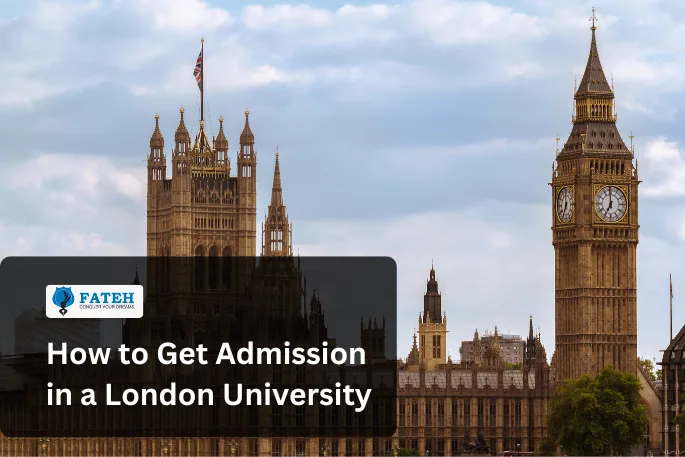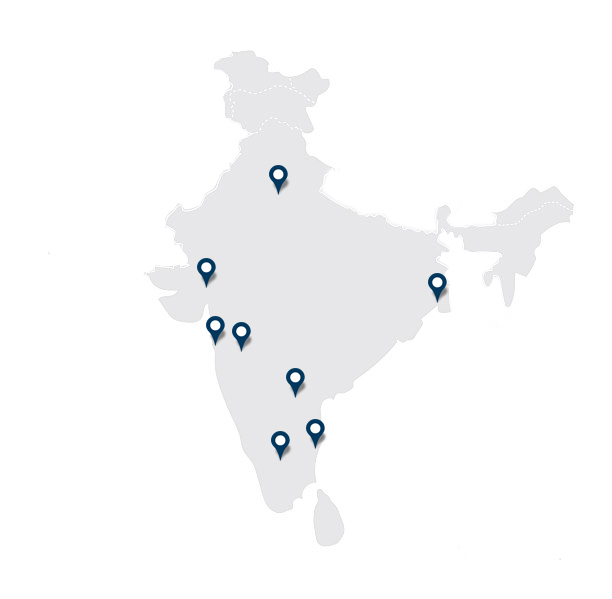Introduction
The idea of studying in London holds a special place in the minds of many Indian students. With its world-renowned universities, diverse academic opportunities and deeply international atmosphere, the city continues to be one of the most popular choices for higher education abroad. But for most students, the challenge isn’t in choosing London—it’s in figuring out how to get there.
Whether you’re aiming for a degree in engineering, arts, business, or biomedical sciences, how to get admission in a London university is a question that rarely comes with simple answers. The process can feel layered and unfamiliar, especially if you’re navigating it for the first time from India. From choosing the right course and meeting eligibility criteria, to gathering documents and meeting visa requirements, every step carries its own set of timelines, tips and technicalities.
This guide is meant to simplify that journey. It breaks down every essential detail—both obvious and lesser known—into clear, actionable steps that reflect what London universities actually look for in Indian applicants. If you’re serious about making it to the UK capital for your studies, this is the roadmap you’ll want to follow.
Understanding Admission Requirements
-
Academic Qualifications
- Undergraduate Courses: Most universities require Class 12 results with 70–85%, depending on the institution and chosen course. Recognised boards like CBSE, ISC, or State Boards are usually accepted.
- Postgraduate Courses: Typically, a minimum of 55–60% in your undergraduate degree is expected. Some competitive courses may ask for higher scores or subject-specific prerequisites.
-
English Language Proficiency
English proficiency is a standard requirement for both undergraduate and postgraduate courses. Most institutions accept:
-
IELTS
- Undergraduate: Overall score of 6.0–6.5
- Postgraduate: Usually 6.5–7.0
- TOEFL or PTE Academic: Accepted by many institutions as alternatives
- Waivers: May be considered if you’ve studied in English medium throughout, but this is not guaranteed and varies by university.
-
Additional Application Components
- Statement of Purpose (SOP): Tailored to the course and university.
- Academic References: Usually 1–2 letters from recent instructors.
- Portfolios or Interviews: Required for select courses like design, fine arts, or journalism.
Choosing the Right London University
-
Course Offerings and Academic Strength
Start with the course, not the university. Some institutions may not rank high overall but are leaders in niche subjects. For instance:
- LSE for social sciences and economics
- UCL for architecture, life sciences and psychology
- King’s College London for health and medicine
-
Location and Lifestyle
London is vast and varied. If you’re looking for a lively, central experience, institutions like LSE or UCL put you in the heart of the city. Others like Brunel University or Middlesex offer quieter, suburban environments with more space and lower living costs.
-
Rankings and Reputation
Use rankings cautiously. The QS and Times Higher Education lists are helpful, but they don’t tell the full story. Look into student satisfaction scores, employability stats and faculty expertise instead.
If you’re considering how to get admission to a London university, start by shortlisting those that truly align with your personal and academic goals. Once you’ve narrowed down your choices, the next step is assembling a strong set of documents that reflect who you are as a student and applicant.
Preparing Application Documents
-
Academic Transcripts
- You’ll need official transcripts from your current or most recent institution.
- For undergraduate courses, this means your Class 10 and 12 mark sheets.
- For postgraduate applicants, include consolidated and semester-wise university transcripts.
-
English Language Test Scores
- Accepted tests include IELTS, TOEFL and PTE Academic.
- Submit your scores directly through the testing body or upload verified copies where allowed.
-
Letters of Reference
- Most universities ask for 1–2 academic references.
- These should come from teachers or professors familiar with your academic work.
- Referees must provide their institutional email addresses—personal emails are often unaccepted.
-
CV or Academic Resume
- Usually required for postgraduate applicants.
- Include education history, internships, work experience, projects and extracurriculars.
-
Passport Copy and ID Proof
- A scanned copy of the passport’s photo page is typically sufficient.
Crafting a Stellar Personal Statement
What Should It Include?
A compelling personal statement should touch on the following:- Academic Background: What subjects have you enjoyed most and why? How have they shaped your interests?
- Career Goals: What do you hope to do with the degree? How does it connect to your long-term plans?
- Why This Course and University?: Demonstrate that you’ve researched the programme thoroughly. Mention specific modules, facilities, or values that align with your goals.
- Personal Qualities and Achievements: Don’t just list accomplishments—explain what you learned from them and how they’ve prepared you for study in the UK.
Writing Tips
- Keep it honest, reflective and personal—admissions teams can tell when a statement feels scripted.
- Avoid clichés. Instead of saying you’re “passionate”, show it through your experiences or choices.
- Stick to the word limit (usually around 4,000 characters for UCAS).
Understanding the Visa Process
Securing a student visa is a key step in the admission journey and it’s one that requires careful planning. For Indian students, the most common route is the Student Visa (formerly Tier 4) which allows full-time study at an approved UK institution.
Key Steps in the Visa Process
- Receive Your CAS (Confirmation of Acceptance for Studies) Your chosen university issues this after you’ve met all offer conditions. It contains a unique reference number required for the visa application.
- Submit Online Visa Application
- Apply via the official UK Government visa website.
- Create an account and complete the application form with your CAS details.
- Book a Biometrics Appointment
- Schedule an appointment at a VFS Global centre in India to provide fingerprints, a photograph and supporting documents.
Documents Required
- Valid passport
- CAS letter
- Proof of funds (tuition fees + living expenses)
- English language test results
- Academic transcripts
- ATAS certificate (for specific courses, mainly in STEM)
Timelines and Processing
- Applications can be submitted up to 6 months before the course start date.
- Most student visas are processed within 3 weeks, though delays can occur during peak seasons.
Securing Financial Aid and Scholarships
-
University-Specific Scholarships
Many London universities offer scholarships tailored to international or Indian applicants:
- UCL Global Scholarships
- King’s College India Excellence Scholarships
- Brunel International Excellence Award
- SOAS International Postgraduate Scholarship
-
Government and External Scholarships
These are often competitive but highly valuable:
- Chevening Scholarships (for master’s students with leadership potential)
- Commonwealth Scholarships
- GREAT Scholarships (specifically for Indian students)
- Inlaks Shivdasani Foundation (for postgraduate study in select fields)
-
University Bursaries and Grants
These are generally smaller amounts than scholarships, but they can still help cover living expenses or study materials.
If you’re exploring how to get admission in a London university without letting cost become a barrier, planning your finances early and applying widely for aid can make a real difference.
Once funding is sorted, it’s time to turn your attention back to the core process—submitting your applications with accuracy, confidence and in line with each university’s expectations.
Navigating the Application Submission
1. UCAS (Universities and Colleges Admissions Service)
Most undergraduate applications to UK universities go through UCAS. Here’s what you’ll need to do:- Register and fill out your profile at ucas.com
- Add course choices (up to five)
- Upload your personal statement and reference
- Pay the application fee (approx. £27 for multiple courses)
- Submit before the deadline—for most courses, it’s 31 January
2. Direct Applications for Postgraduate Courses
Many postgraduate applications are submitted directly through the university’s admissions portal. You’ll typically be asked to:- Create an applicant profile
- Upload documents (transcripts, SOP, references)
- Pay any required application fees
- Track your application through the portal
Final Checks Before Submission
- Double-check spelling, formatting and consistency
- Ensure all documents are named clearly and uploaded in the correct format
- Save a copy of your application confirmation
Conclusion
Getting admission to a London university as an Indian student is a multi-step journey that involves research, planning and timely action. From shortlisting universities and preparing strong documents to writing a compelling personal statement, arranging finances and securing your visa, each step plays a crucial role. Knowing how to get admission in a London university goes beyond just eligibility—it’s about presenting a thoughtful, complete application that reflects both your potential and preparation.
At Fateh Education, we’ve guided thousands of students through this exact journey. With personalised support, university shortlisting, SOP assistance and visa guidance, we simplify what can otherwise feel overwhelming.
If you’re ready to take the next step in your study abroad journey, we’re here to help you do it with clarity and confidence.
FAQs
Look at the course content, faculty, campus location and student support services. Consider lifestyle preferences—city centre vs suburban settings—and cost of living. University rankings help, but also check student reviews and attend virtual open days for better insight.
Yes. Through UCAS, you can apply to up to five universities at once. For postgraduate courses, most allow direct applications to multiple institutions. Just ensure each application is tailored to the specific course.
Focus on academic interests, relevant experiences and clear career goals. Show why the course suits you, avoid clichés and keep the tone honest and reflective. Structure, clarity and proof of motivation matter most.
Yes. Options include Chevening, Commonwealth and GREAT Scholarships, along with university awards like those from UCL, King’s College and SOAS. Some are merit-based, others need-based—apply early and check each scholarship’s criteria.
Once you receive your CAS, the UK student visa usually takes around 3 weeks to process. Apply up to 6 months in advance, keeping time aside for document prep and biometric appointments.


